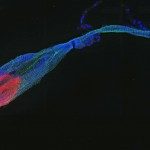Link to Pubmed [PMID] – 15642963
Am. J. Trop. Med. Hyg. 2004 Dec;71(6):739-44
Plasmodium species, the etiologic agents of malaria, are obligatory sexual organisms. Gametocytes, the precursors of gametes, are responsible for parasite transmission from human to mosquito. The sex ratio of gametocytes has been shown to have consequences for the success of this shift from vertebrate host to insect vector. We attempted to document the effect of chemotherapy on the sex ratio of two different Plasmodium species: Plasmodium falciparum in children from endemic area with uncomplicated malaria treated with chloroquine (CQ) or sulfadoxine-pyrimethamine (SP), and P. vinckei petteri in mice treated with CQ or untreated. The studies involved 53 patients without gametocytes at day 0 (13 CQ and 40 SP) followed for 14 days, and 15 mice (10 CQ and 5 controls) followed for five days. During the course of infection, a positive correlation was observed between the time of the length of infection and the proportion of male gametocytes in both Plasmodium species. No effects of treatment (CQ versus SP for P. falciparum or CQ versus controls for P. vinckei petteri) on the gametocyte sex ratio were found for either Plasmodium species. This indicates that parasites do not respond to chemotherapy by altering their sex allocation strategy, even though, in the case of P. falciparum, they apparently increase their overall investment in sexual stages. This suggests that malaria parasite species respond to different environmental cues for their sex differentiation and sex determination.



